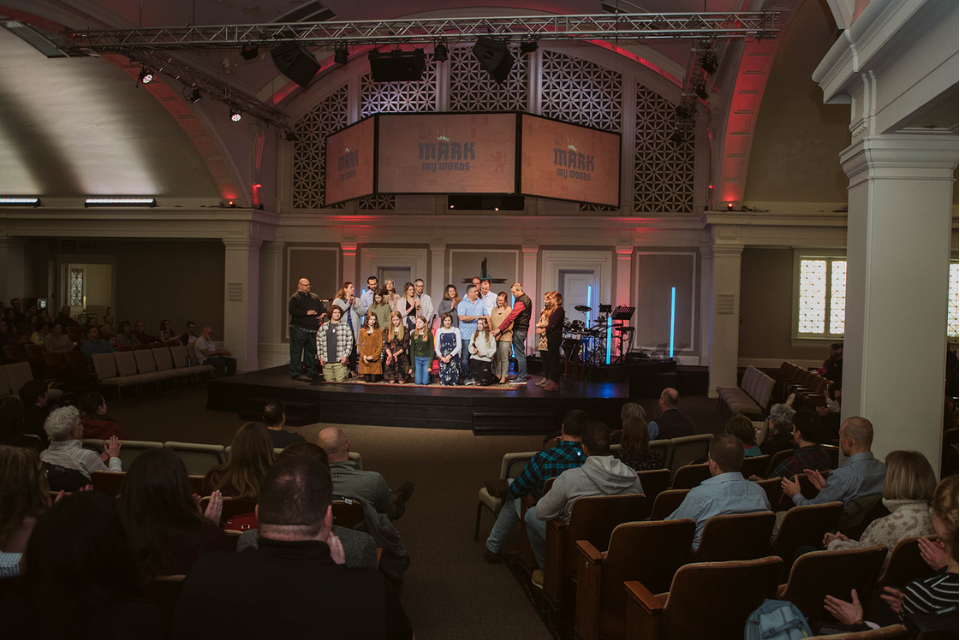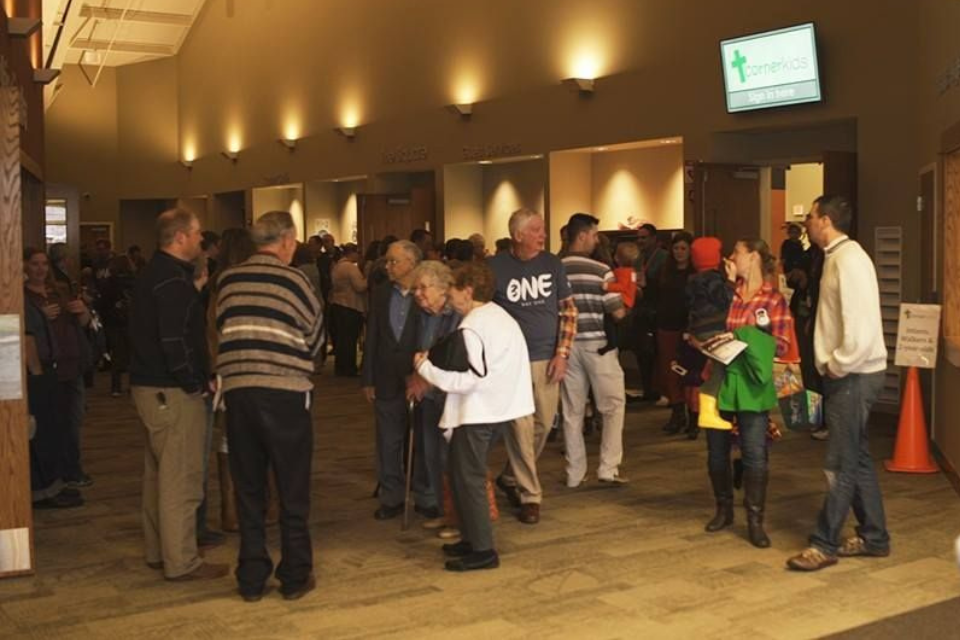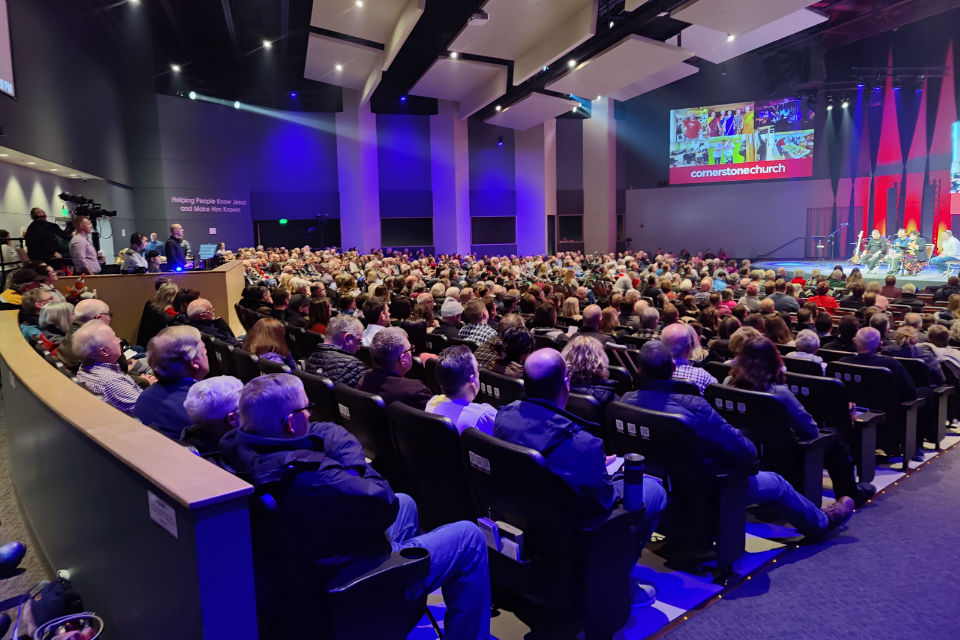Cornerstone Church, Michigan’s largest worshiping congregation, votes to leave the UMC and become nondenominational.
JAMES DEATON
Content Editor
CALEDONIA, MI—On Mar. 19, Cornerstone Church, the Michigan Conference’s largest worshiping congregation, voted to disaffiliate from The United Methodist Church and become nondenominational.
The congregational vote on Sunday afternoon followed a period of discernment among members and leadership focused on the church’s relationship with the denomination and the launch of the Global Methodist Church.
Over 600 church members met at the main Caledonia campus, which is situated at the corner of 84th St. and Kalamazoo Ave., south of Grand Rapids. Cornerstone has grown in recent years to become a multisite congregation with satellite campuses in downtown Grand Rapids in the Heritage Hill neighborhood and Wyoming, a suburb west of the city.
With an average of almost 1,300 persons attending weekly worship across all three campuses, Cornerstone is the Michigan Conference’s largest congregation. This total does not include the hundreds that worship online (average virtual worship attendance is 877, according to 2022 statistics). As far as professing members, three other Michigan congregations are larger than Cornerstone: Birmingham: First, Rochester: St. Paul’s, and Clarkston.
Cornerstone Church has had a dramatic 33-year history as it has sought to fulfill its gospel mission: “Helping People Know Jesus and Make Him Known.” It has consistently been one of the fastest-growing churches in The United Methodist Church.
Cornerstone was founded as a church plant out of the West Michigan Conference in 1990, the result of a conference-wide project to start almost two dozen new churches, an initiative that was led by conference staff member Rev. Denny Buwalda, who was Director of New Church Development at the time.
Another key United Methodist in those formative years was Fred Keller, Sr., a generous philanthropist who attended Grand Rapids: First UMC and was asked by then-Bishop Judith Craig to spearhead fundraising efforts for this new evangelistic initiative.
Keller approached Rev. Brad Kalajainen, who was the associate pastor at this downtown church, to see if he’d be open to leading one of these church-planting groups.
“I said, absolutely,” Kalajainen noted as he reflected on that period of ministry. “I had a strong background in evangelism, and I had always desired to be a church planter but didn’t have any idea how that would come about. And Fred made it happen.”
Kalajainen volunteered to focus on the church plant in Gaines Township in Kent County, since his wife, Colleen, already taught in the school system there. Gaines Township was considered, at the time, one of the fastest-growing areas. Brad and Colleen, along with about 20 friends from Grand Rapids: First, began meeting in their home basement for weekly Bible study. And then they got to work making phone calls to their neighbors.
Inspired by a method of planting churches via telemarketing that was popular in the ’90s, this small group set up a phone bank at the conference center and recruited volunteers from other United Methodist churches. They called for 10 nights straight for two hours a night, ending up making 11,000 phone calls. They had about 950 positive responses and invited each household to the first worship service held at South Christian High School.
Cornerstone Church had about 250 at that first service. About 150 visitors from the community came as a result of their calls, with a hundred other United Methodists attending in support of the new ministry. Kalajainen said, “[Worship attendance] never dipped below 120, and then it went up from there.”

In the first decade, Cornerstone built its first brick-and-mortar church building on 68th St., but had outgrown it by 2005, even after building two additions. Then, in the middle of a recession, with Michigan leading the country in unemployment, Kalajainen led Cornerstone in a leap of faith by launching a $13 million project to relocate. They purchased the land where the Caledonia main campus sits, built a new church, and opened doors in Oct. 2009.
In 2013, led by Kalajainen and Rev. Ken Nash, who had joined the staff in 2006, Cornerstone became a multisite ministry. A hundred-year-old church building was purchased in the historic Heritage Hill neighborhood in downtown Grand Rapids. Rev. Alex Fernandez was appointed as campus pastor. In 2014, Cornerstone was approached by a United Methodist church that was closing its location. They gave their debt-free building and property to Cornerstone. In Oct. 2015, under Rev. Marcus Schmidt, the South Wyoming campus was launched.
Kalajainen retired from active pastoral ministry in 2021, and Nash, who had left in 2016 to pastor a church in Buffalo, NY, returned to Cornerstone to become the current lead pastor.
Over the years, Cornerstone has held onto its United Methodist identity by supporting connectional ministry here in Michigan and beyond. They have faithfully paid their Ministry Shares annually to the Michigan Conference. More broadly, they’ve given financially to United Methodist campaigns like Imagine No Malaria and to Africa University for student scholarships. They’ve also provided space for workshops, trainings, and conference events.
And even though they have voted to separate from The United Methodist Church and become an independent, nondenominational church, they do not wish to sever all ties. Pastor Nash noted that they want to stay connected to The United Methodist Church but also want to be in relationship with other denominations. They already support a wide variety of Christian ministry organizations in the greater Grand Rapids area and around the world.
“We like being networked and connected,” he said. “We love the idea of connectionalism. So this isn’t a renegade spirit that we have. We want to have connection in the future. It just doesn’t have to be as formalized.”
Rev. Margie Crawford, superintendent of the Midwest District, has been assisting Cornerstone through the disaffiliation process and confirmed this congregational personality trait: “They are United Methodist, but they’re more than United Methodist. That’s the best way to say it.”
Crawford sees evidence of some of those United Methodist ties remaining after the formal separation is complete. Cornerstone has committed to continuing to financially support La Nueva Esperanza UMC, a Hispanic congregation in Grand Rapids, something they’ve been doing for some time.

“The beauty of Cornerstone,” Nash explained, “is that we have a Methodist heart, meaning we’re a big tent. We have a lot of diversity of thought, theologically.” He went on to explain that, even though they have been pigeonholed at times as being theologically conservative, they’ve worked hard to stay open to having tough conversations. This has helped them become a bridge, creating a safe space for people.
The question surrounding disaffiliation from The United Methodist Church has been a recent tough conversation that Cornerstone has had, in light of the schism facing the denomination, the launch of the Global Methodist Church, and the postponement of General Conference due to the COVID-19 pandemic (currently scheduled for 2024).
When the Global Methodist Church formalized in May 2022, tensions grew among Cornerstone’s congregation as people were affected by polarizing rhetoric in the media and via social media. As the voices got louder and louder, Nash said that it was becoming clear that there was no freedom for Cornerstone to stay in this big tent of diversity. Instead, they were being forced to choose. So members of the congregation started asking leadership: Are we going to go United Methodist, which is leaning toward more progressive thought, or are we going to go Global Methodist, which is leaning toward more conservative thought?
According to Nash, this movement caused leadership to bring it to the forefront instead of waiting until General Conference 2024. That’s when Cornerstone leadership also learned about paragraph 2553 from The Book of Discipline and the disaffiliation process set in place by directions passed at the 2019 Special Session of the General Conference.
“We realized we can have a gracious exit,” Nash confessed. “And because of the graciousness of [Bishop David Bard], we can have a gracious exit. That allowed us an opportunity for more dialogue around how can we continue to be a bridge between the differences and not be forced into one camp or another.”
Then, starting in January of this year, Cornerstone hosted a series of town hall meetings to transparently discuss the matters with church members and discern a way forward. They had a total of 11 sessions, including one for online participants. Materials provided by the Michigan Conference, including the “Blessing One Another” FAQ sheet and video, were shared.
“It’s been a healthy dialogue,” said Nash. “We shared where leadership was looking. And we let the congregation really speak.” The culmination of these conversations was last Sunday’s vote to disaffiliate and become independent: 616 voted yes, 9 voted no, and 2 abstained. “It was a holy moment,” Nash noted. “There was a lot of theological diversity in the room and yet a unified love for Jesus Christ. It was a little glimpse of heaven that day.”
Rev. Margie Crawford was present for the meeting and the vote. She noted that even though Cornerstone has been amenable to the disaffiliation process and all the financial requirements, and even though it was an overwhelming majority, the vote on Sunday was still painful. From her perspective, it was a somber moment. “There was no clapping when the vote was revealed. There was no cheering.”
She did wish them well. “I tell every church that I have to preside over this. I honestly don’t care what you call yourselves. I care that you continue to be in mission and ministry. With Cornerstone, I have no doubt that will continue.”
Bishop David Bard has repeatedly called for “spaciousness” in Michigan, with the understanding that there is a broad range of beliefs and approaches to Scripture. Bishop Bard said, “In the long run, all churches seek to be in ministry for Jesus Christ, offering hope and healing and seeking justice and reconciliation. I wish Cornerstone and its leaders well as they move into a new chapter of their ministry. I also pledge to work with any in the church that wishes to continue to be part of a United Methodist congregation.”
According to Cornerstone Church’s leadership, they will work with conference leaders to help those who want to remain in The United Methodist Church transition to a new church home. The conference has established this website to care for those wishing to remain members of The United Methodist Church.
Cornerstone Church’s disaffiliation will not be formally ratified until delegates to the 2023 Michigan Annual Conference vote in June. For those congregations considering this option, there will be another opportunity for churches to formally disaffiliate at the forthcoming special session of the annual conference on November 30, using a virtual format.
As Cornerstone prepares to leave the denomination, church leadership expressed gratitude for the Michigan Conference and the formation they received from The United Methodist Church.
Brad Kalajainen said that he is forever grateful for the startup money the conference provided for the first couple of years of Cornerstone’s existence. “We wouldn’t have done that,” he said, “without an initial startup fund.”
Ken Nash spoke about how The United Methodist Church has shaped and molded him. “It’s all I’ve ever really known in leadership. It’s made me who I am today, so I’m grateful.”
He also spoke about the disaffiliation process. “I’m grateful to our bishop, to our cabinet, and to Rev. Margie Crawford. They’ve been exceptional through this time of discernment, and it’s been painful, it’s been emotional. And yet this is a healthy next step for us.”
Last Updated on October 27, 2023

